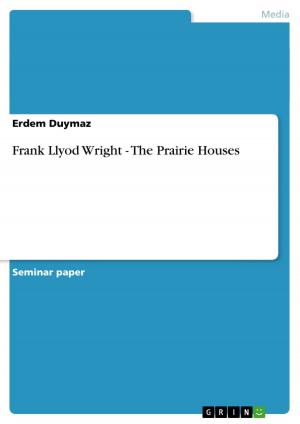| Author: | Ireen Trautmann | ISBN: | 9783638743624 |
| Publisher: | GRIN Publishing | Publication: | May 9, 2007 |
| Imprint: | GRIN Publishing | Language: | English |
| Author: | Ireen Trautmann |
| ISBN: | 9783638743624 |
| Publisher: | GRIN Publishing |
| Publication: | May 9, 2007 |
| Imprint: | GRIN Publishing |
| Language: | English |
Seminar paper from the year 2006 in the subject American Studies - Literature, grade: 1,3, University of Rostock (Institut für Anglisitk und Amerikanistik), course: African American Plays of the 1960s, 23 entries in the bibliography, language: English, abstract: Dutchman was first presented at the Cherry Lane Theatre in New York in 1964. As the best Off-Broadway Play it gained an Obie-Award the same year and was made into a film in 1967 which made it widely known.2 Later, Dutchman was internationally successful because of being produced and performed in other metropolises like Paris, Berlin and Spoleto (Italy). Being Baraka's most widely acclaimed play, which is often regarded as his break through and the break through of African American theatre, it convinces up to now and gives occasion for discussions about its intentions and its historical background. It is titled as [...] a triumph of stagecraft, a model two-acter whose economy and handling of pace and denouement were not to be doubted.3 Although the play was generally well received4, it provoked critical controversy amongst its audience as well5. Dutchman was performed for a dual audience. Initially, it played to primarily white audiences until Baraka moved it to the black audiences of Harlem6. For both, it was something new: The white audience was confronted with a new type of black man because up to now they had just known the nigger minstrel who was harmless and acceptable to them because he was de-sexed, trapped in a role which combined self-mockery with an endearing musicality7. The Negro is not presented as a primitive African savage8 anymore. For the black people, precisely for the black non-reading audiences of the lower classes, it was the first time to be confronted with theatre.
Seminar paper from the year 2006 in the subject American Studies - Literature, grade: 1,3, University of Rostock (Institut für Anglisitk und Amerikanistik), course: African American Plays of the 1960s, 23 entries in the bibliography, language: English, abstract: Dutchman was first presented at the Cherry Lane Theatre in New York in 1964. As the best Off-Broadway Play it gained an Obie-Award the same year and was made into a film in 1967 which made it widely known.2 Later, Dutchman was internationally successful because of being produced and performed in other metropolises like Paris, Berlin and Spoleto (Italy). Being Baraka's most widely acclaimed play, which is often regarded as his break through and the break through of African American theatre, it convinces up to now and gives occasion for discussions about its intentions and its historical background. It is titled as [...] a triumph of stagecraft, a model two-acter whose economy and handling of pace and denouement were not to be doubted.3 Although the play was generally well received4, it provoked critical controversy amongst its audience as well5. Dutchman was performed for a dual audience. Initially, it played to primarily white audiences until Baraka moved it to the black audiences of Harlem6. For both, it was something new: The white audience was confronted with a new type of black man because up to now they had just known the nigger minstrel who was harmless and acceptable to them because he was de-sexed, trapped in a role which combined self-mockery with an endearing musicality7. The Negro is not presented as a primitive African savage8 anymore. For the black people, precisely for the black non-reading audiences of the lower classes, it was the first time to be confronted with theatre.















